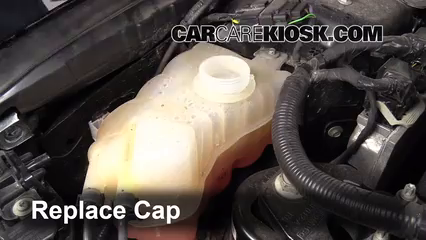Some cars leak a little bit of coolant over time for a variety of reasons.
Coolant reservoir cap leak.
This could be out the overflow reservoir the reservoir hose radiator cap coolant hoses or into the engine from a head gasket leak.
Sometimes cracks will form on the overflow tank if it is too old and worn out.
A crack in the coolant reservoir could cause a slow leak of coolant and could also cause your car to overheat.
Usually filled to one third of it s capacity the coolant reservoir provides storage for coolant when the radiator purges coolant as it heats up.
If the radiator cap is stuck the proper amount of coolant cannot be released appropriately and this causes coolant temperature and coolant pressure increasing.
The radiator cap is designed to allow access to fluids in a closed system.
You can easily diagnose and fix a coolant reservoir tank leak.
Never open a radiator cap when the engine is hot.
Symptoms to look for that indicate low coolant in the car.
Small leaks may produce steam and drips while larger leaks will produce streams and puddles as well as an obvious coolant odor.
If the radiator coolant overflow tank is damaged or cracked then you can expect coolant fluid to leak out of it.
This drives to consequent leaking of the coolant through the radiator pressure cap.
A poorly maintained antifreeze system defective components or a rapid change is the driving style may contribute to this coolant disappearing.
What is the reason behind coolant leaking from the car s bottom.
Top 4 bad coolant reservoir overflow tank symptoms.
Top it off to the full line and keep an eye on it for now.
The faulty reservoir cap.
Losing coolant but no leak.
If you have a leaky or a weak radiator cap you may experience loss of coolant from the overflow tube every time the coolant heats up.
Another symptom of a potential problem with the coolant reservoir is coolant leaks.
Check your owner s manual for proper cap replacement.
1 leaky radiator cap.
Leaked coolant stays in between the radiator upper tank and the radiator upper body.
The radiator cap comes in different pressures.
There may be times that the reservoir radiator cap may turn out to be faulty.
This repair should always be made on a car that has cooled.
Check the coolant every day to see if the level drops.
Here are four of the most common signs of a bad radiator overflow tank.
If the coolant reservoir cracks or breaks due to old age or overheating it will leak.
Below are the common causes to your coolant leaks.
The coolant used to cool the engine does so at maximum efficiency when kept at specific pressure.
It provides the extra coolant the radiator and cooling system need in the event of a leak and prevents overheating.
It is a good idea to check the level of the coolant reservoir tank with every few gas fill ups.
Where is my coolant going.
It may sound ghostly if you think of coolant loss no visible leak.

